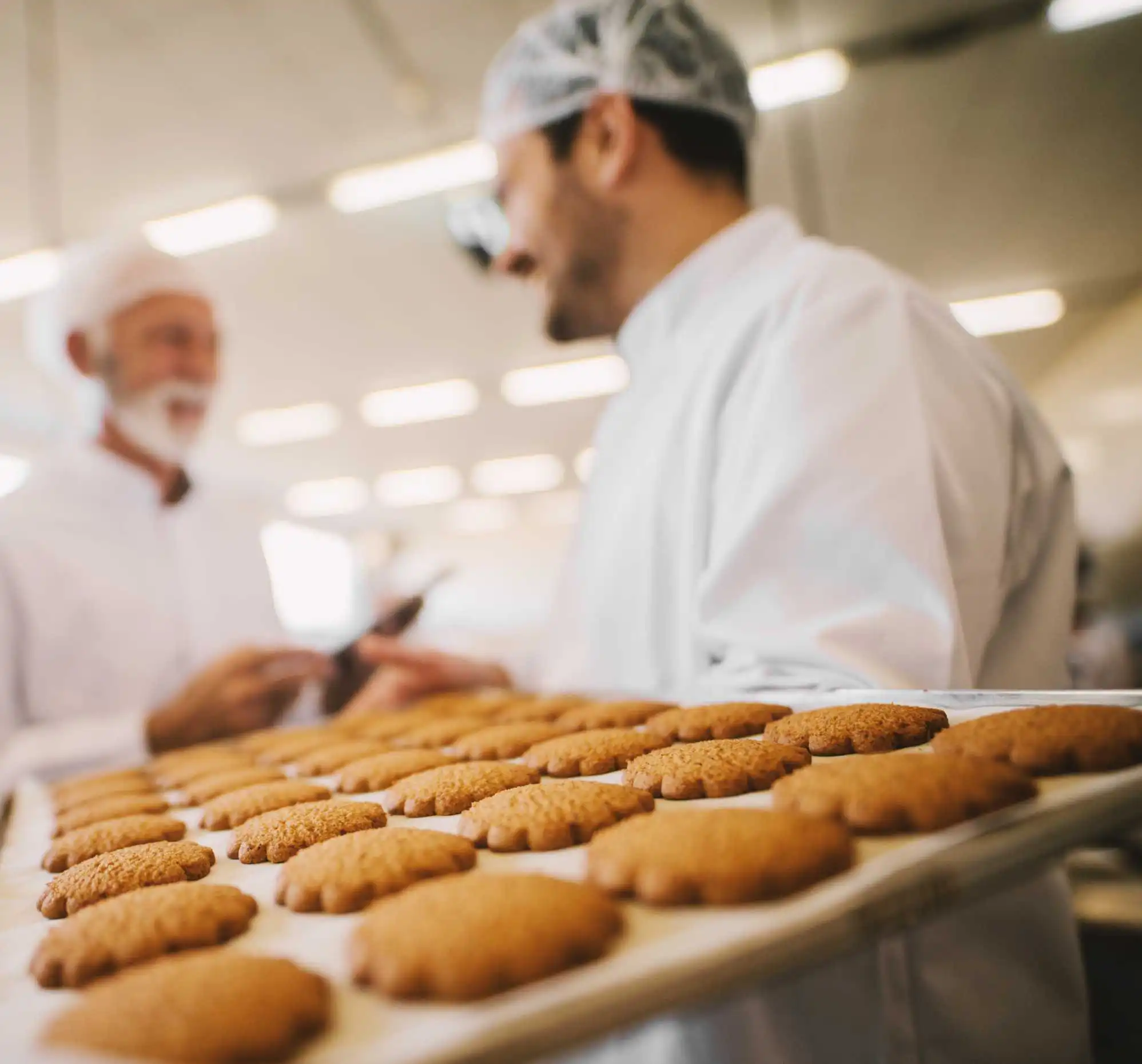
The CHOPIN Technologies Alveolab® is an easy to use, versatile analyzer that provides automated testing of flour and dough characteristics. The instrument is self-controlled with its own cooling system, automatic water injection, and automatic positioning, crushing and blowing of the dough patties. The Alveolab® is more adaptable with a wider range of protocols and meets international standards.
Automated & Fully Controlled Alveograph Test Conditions
Alveolab® analyzers are the industry standard tools used to measure rheological properties of dough. Read how the CHOPIN Alveograph products are being used in the industry:
National Center for Biotechnology Information: https://www.ncbi.nlm.nih.gov/pmc/?term=alveolab
Google Scholar: https://scholar.google.com/scholar?hl=en&as_sdt=0%2C5&q=alveograph+chopin&btnG=
Benefits
- Understand dough behavior to ensure consistency in appearance, size, aroma, and structure.
- Monitor incoming wheat or flour to ensure you are starting with high-quality ingredients
- Improve efficiency by conducting multiple tests throughout the day
- Acts as a reference measurement for grains and cereals, both for quality control and developing new products
- Measure and adapt flour according to specifications
- Use proven, industry-standard analysis for your testing procedures
Features
- Provides universally recognized measurements for the main rheological properties – tenacity, extensibility, elasticity, and baking strength
- New whole wheat test protocol
- Customizable protocols
- Can be used for both hard and soft wheat
- Automatically controls testing temperatures
- Easy to use – simple, modern and intuitive interface
- Standardized analysis – meets AACC 54-30, ICC 121, NF EN-ISO 27971, and GOST 51415-99 standards
- Standardized data export for integration into a LIMS
Applications
Internationally Recognized As The Industry Standard Reference for Grains & Cereals
The Alveolab® is used by millers and bakers all over the world to provide test results that serve as reference for grains and cereals. Applications for the Alveolab® include analysis of:
- Wheat selection for baked goods or pasta
- Wheat or flour blends
- Vital gluten
- Salt and sugar impacts
- Durum wheat
- Additives and ingredients (proteases, amylases, deactivated yeasts, etc.)
- Insect contaminated wheat












Lineup

AlveoPC - For Use in Controlled Lab Environments
- Smaller, cost-effective benchtop analyzer
- Includes a mini-PC for data collection
- Comprehensive test data
- All data is backed up to ensure perfect traceability
Product Lineup
How It Works
Focus on the Analysis, Not the Training
The Alveograph test consists of producing a test piece of dough, which, under air pressure, turns into a bubble. This process reproduces the deformation of the dough when subjected to carbon dioxide during fermentation.

The Alveolab® does not require extensive training, allowing staff to begin using the analyzer right away. In addition, new employees can be trained quickly instead of spending more time learning the system. With the labor shortages facing the industry and employee turnover, being able to train employees in less time means you can continue analysis without large gaps in your schedule. The Alveolab® also allows you to conduct multiple tests simultaneously, which saves time and cost. The ease of use and versatility results in ROI being realized quickly.
The Test Involves Four Main Steps
- Mixing flour and salted water
- Preparing five calibrated pieces of dough
- Putting these pieces of dough to rest
- Automatically inflating each piece of dough until the resulting bubble bursts

Automated & Fully Controlled Test Conditions
- Automatic regulation of temperature and hygrometry, meaning the results are independent of environmental conditions.
- The positioning and the inflation of the dough pieces are automated and carried out in a temperature and humidity-controlled compartment.
- The inverted bubble is more spherical and closer to the ideal conditions of the test.
- Results are provided in graphical and table format to quickly assess the dough behavior.
Dough Hydration
- At the beginning of the test, water is added automatically and very precisely.
- The temperature of the water tank is regulated.
Integrated Cooling System
- Cooling is assured by an integrated system (Peltier effect). Therefore, there is no need to connect the equipment to a cooling water system.
Adapted Hydration Test
- The Alveolab, equipped with its “Adapted Hydration Kit,” allows testing of flours based on their actual absorption capacities. The protocol requires an initial Consistograph test, which lasts only 5 minutes, to determine the flour's water absorption capacity. After the Consistograph test, the adapted hydration Alveograph test proceeds as normal. This process provides users with a better understanding of their flour’s functionality using a water level more consistent with production conditions, especially for hard wheat flour types.
Extrusion and Cutting of Dough Pieces
- Resting plates have a high-resistance anti-adhesive coating to facilitate the preparation of dough pieces.
- Dough cutter is semi-automatic and very easy to use.


Whole Wheat Test
A unique feature of the Alveolab® is its ability to analyze whole wheat flour. The Alveolab® is the only Alveograph that can measure whole wheat flour. Whole wheat flour has a high hydration capacity, longer development times, and is more fragile due to large particles, which makes it more challenging to test. With a new testing protocol, these challenges have been removed and bakeries can use one instrument for testing all types of flours.
System Components
Fully Featured for QC, R&D, and New Product Development
The Alveolab® is simple to use, either at constant or adapted hydration (Alveo-AH optional kit). It is self-controlled with its own cooling system, automatic water injection, and automatic positioning, crushing, and blowing of dough patties.
An operator can adjust temperatures, mixing speed, air flow, relative humidity, and test timing.
This versatility allows the user to test various formulations for new recipe development and understand how the dough will perform on the production line. The data is used to determine the best flour mixture and for implementing the final production process.

The main elements of the Alveolab® are:
- Mixer bowl
- Water tank
- Resting chamber
- Test platin
- Recording system (miniPC with installed software)
Measurements
Additional Protocols
The Alveolab®includes more protocols than the AlveoPC, including:
- Whole wheat test protocol
- Relaxation protocol
- Hybrid protocol
- Consistograph analysis (Alveo-AH optional kit)
- Alveographic analysis - protocol at adapted hydration (Alveo-AH optional kit)
- Creation of new specialized protocols (mixing, speed, duration, etc.)
Versatile System
With the wide range of wheat flours available around the world, analysis data is increasingly important for millers and bakers to characterize each and determine how they will perform for baking. With the Alveolab®, the operator can adjust temperatures, mixing speed, air flow, relative humidity, and test timing. This versatility allows millers and bakers to be ready for new challenges and to better approximate specific processes. An example of a new challenge is whole wheat flour. Previously, it was not possible to analyze whole meal flour with the Alveograph classical method. Now, with the Alveolab®, whole meal flour can be analyzed. New baking innovations are happening all the time and the Alveolab® is built with the future in mind.

Standards
- ISO 27971, AACC54-30.02, ICC 121, GOST 51415-99
- + ICC 188
- + UNI 10453
- + ICC 188: Alveo AH
- + UNI 10453: Durum wheat semolina
Characteristic Curve and Measurements
The alveograph data is used to understand dough properties:
- Tenacity – ability of the dough to resist deformation when being stretched
- Elasticity – ability of a dough to spring back when it is stretched
- Extensibility – ability to stretch without breaking
- Baking strength – global energy necessary to deform the dough into a bubble until rupture

P: Tenacity (capacity to resist deformation)
Tenacity depends on water absorption capacity:
- Protein quantity and quality
- Starch damage
- Fibers (pentosans, ash content)
For a given hydration, tenacity represents the dough consistency (how hard a dough is)
L: Extensibility (maximum volume of air the bubble can contain)
Extensibility depends on:
- Protein quantity and quality (mainly)
- Extensibility represents the dough potential to stretch to hold gas (gas retention capacity)
P/L: Curve configuration ratio of tenacity and extensibility
Ie: Elasticity index, le = P200/P (P200: pressure at 4 cm from the beginning of the curve)
- Elasticity represents the capacity of a dough to stretch and return to its initial position when stress ends
- It is measured 40 mm after the beginning of the curve (L = 40)
- At this instant, the quantity of air injected in the bubble is 200 ml.
- The bubble volume at this instant indicates the dough resistance to deformation. It is a way to evaluate the elasticity.
W: Dough baking strength (area under the curve) or Energy value
Baking strength depends on:
- Protein quantity and quality
- Starch damage
- Enzymes
- Interactions
Stress/strain, first derivative and consistency recording during mixing: new parameters are available with theAlveolab® and improve the discriminating and predictive potential compared to other models.
Software
Alveolab® software provides straightforward, comprehensive, and intuitive data with information about tenacity, extensibility, elasticity, and baking strength. It allows the lab technician to make decisions about blends or additives. A standard analysis certificate is automatically generated for use in verifying the test results.
All traditional parameters can be obtained with the Alveolab®; additionally, the analysis data includes:
- First derivative
- Stress/Strain curve
- Possibility to record the dough consistency during mixing
- Obtain more data during testing to better predict the dough behavior and final product
Alveolab® software provides straightforward, comprehensive, and intuitive data with information about tenacity, extensibility, elasticity, and baking strength. It allows the lab technician to make decisions about blends or additives. A standard analysis certificate is automatically generated for use in verifying the test results.
All traditional parameters can be obtained with the Alveolab®; additionally, the analysis data includes:
- First derivative
- Stress/Strain curve
- Possibility to record the dough consistency during mixing
- Obtain more data during testing to better predict the dough behavior and final product


Additional Features
Alveolab® software includes additional features, including details about blends, an improver guide and virtual storage:
Additional Features
Alveolab® software includes additional features, including details about blends, an improver guide and virtual storage:

Blends
Select up to 5 products and automatically find the most affordable blend that corresponds to your target Alveograph values.
Blends
Select up to 5 products and automatically find the most affordable blend that corresponds to your target Alveograph values.

Improver Guide
Helps you to quickly choose the most suitable additive to obtain target Alveograph values.
Improver Guide
Helps you to quickly choose the most suitable additive to obtain target Alveograph values.
Virtual Storage
- Virtually attribute a product to a silo or a cell and enter its price
- Analysis traceability
- Monitor over time the quality of a specific product in relation to a given supplier or customer
Virtual Storage
- Virtually attribute a product to a silo or a cell and enter its price
- Analysis traceability
- Monitor over time the quality of a specific product in relation to a given supplier or customer
Accessories
Accessories to Streamline Testing
The Alveograph® includes several helpful accessories to make testing easier and faster for users:
- Semi-automatic cutter for consistent patty size samples, and ease of processing
- TeflonTM -coated resting plates to avoid sticky residue and easy cleaning
- Reference flours to ensure accurate testing (optional)
- Dedicated CPU (MiniPC) running under Windows 10 IOT



Specifications
Frequently Asked Questions
Paraffin oil and Sunflower oil can be substituted for peanut oil universally. Other oil types can be used, depending on the wheat used.
If your lab is temperature and hygrometry control, you can use the AlveoPC. Otherwise, the Alveolab provides automatic regulation of temperature and hygrometry, meaning the results are independent of environmental conditions.
The Alveolab and AlveoPC are capable of working with all types of hard and soft wheats. The Alveolab can also measure whole wheat dough properties.
No, everything you need for preparation of the dough and to perform the test is integrated into the Alveolab and AlveoPC.
Resources
























